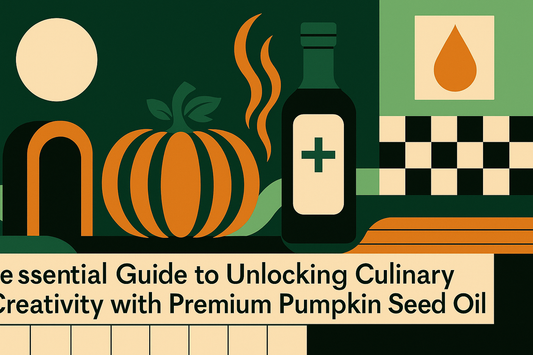
Pumpkin Seed Oil vs. Ghee: Understanding the Culinary and Nutritional Differences
Introduction
The search for the ideal culinary fat has become a popular topic in modern kitchens. With interests shifting toward both wellness and unique flavors, the debate of pumpkin seed oil vs ghee has captured many imaginations. In this discussion, the focus lies on comparing the nutritional profiles, cooking applications, and lifestyle suitability of these two fats. The intention is to offer a balanced look at each option for those interested in exploring new ingredients without making any specific dietary guarantees.
Overview of Pumpkin Seed Oil
Background & Production
Pumpkin seed oil, particularly the premium example offered by Belvoro, is crafted using modern extraction techniques that carefully preserve its natural quality and rich flavor. Rooted in a proud Slovenian heritage, this oil reflects a refined process that distinguishes it from traditional methods. Its production emphasizes quality and careful handling, making it a favored ingredient for those seeking plant-based culinary accents.
Nutritional Profile
This plant-based oil boasts an array of beneficial nutrients and antioxidant compounds. Rich in healthy fats and micronutrients, pumpkin seed oil offers a distinct nutritional makeup that appeals to health-conscious cooks interested in the nutritional differences between pumpkin seed oil and ghee. Many appreciate this oil for the way it supports a balanced diet.
Culinary Applications
In the kitchen, pumpkin seed oil stands out for its unique, nutty flavor and refined aroma. It can enhance salads, drizzled vegetables, and even finished dishes with a special touch. The pumpkin seed oil ghee debate often highlights how its light yet distinctive taste brings a contemporary twist to both traditional and modern recipes.
Overview of Ghee
Background & Production
Ghee has a long history in many culinary traditions, produced by clarifying butter to achieve a richly flavored, dairy-based fat. This time-honored process yields a product deeply connected to its cultural roots and culinary heritage. Many enthusiasts value ghee for its nostalgic quality and deep, comforting taste.
Nutritional Profile
Ghee is especially known for its concentrated saturated fats and fat-soluble vitamins. Its nutritional characteristics set it apart as an animal-based fat, often appealing to those who appreciate its robust profile. However, these qualities also mark a clear difference when compared to plant-based options like pumpkin seed oil.
Culinary Uses
Common in high-heat cooking, ghee holds its ground even at elevated temperatures owing to its high smoke point. Its warm, roasted flavor is prized in various cuisines and is often used to create dishes that require a deep, buttery richness. Whether used in frying or as a finishing oil, ghee continues to be a staple for many traditional recipes.
Nutritional Comparison
Fat Composition & Micronutrients
When comparing these fats, the key differences become evident. Pumpkin seed oil is celebrated for its collection of unsaturated fats and antioxidant compounds, offering a plant-based option abundant in beneficial micronutrients. In contrast, ghee supplies a denser profile of saturated fats and fat-soluble vitamins. The culinary fat comparison between these two reveals unique advantages on each side of the spectrum.
Dietary Considerations
Dietary preferences play an important role in making a choice. While ghee’s dairy origin means it is not suitable for vegan diets or those with lactose sensitivities, pumpkin seed oil stands out as an alternative that meets plant-based needs. This aspect is crucial for anyone weighing the pumpkin seed oil ghee debate in the context of personal or dietary restrictions.
Culinary and Flavor Comparison
Flavor Profiles & Cooking Techniques
The flavor of pumpkin seed oil is characterized by a gentle, nutty taste with a subtle earthiness, making it an excellent choice for finishing touches and delicate recipes. On the other hand, ghee offers a rich, roasty flavor that elevates high-heat cooking methods. Each fat brings a different profile to the table, ensuring that both options shine when used appropriately in various cooking techniques.
Recipe Adaptability
Each fat has its own set of strengths in the kitchen. Pumpkin seed oil, for instance, can boost simple salads or add a sophisticated note to a gourmet dish. Alternatively, ghee’s robust character is ideal for traditional recipes and dishes that demand a deeper buttery flavor. Deciding on the best cooking fat among pumpkin seed oil and ghee ultimately hinges on the specific culinary creation you wish to explore.
Lifestyle and Practical Considerations
Storage, Shelf-Life, and Cost
Practical aspects also matter when comparing these fats. Pumpkin seed oil, such as the high-quality Belvoro Pumpkin Seed Oil, usually requires careful storage away from light and heat to maintain its quality. Ghee, on the other hand, is known for its long shelf-life and may have different storage needs. Price considerations vary, and your budget as well as usage frequency can guide the decision-making process.
Choosing Based on Personal Needs
The decision between these ingredients depends largely on your culinary style and dietary goals. Whether you prefer a plant-based oil with a unique nutritional profile or an animal-derived fat recognized for its traditional richness, the choice ultimately rests on personal taste, nutritional objectives, and sustainable practices in your kitchen.
Conclusion
The comparison between pumpkin seed oil and ghee highlights how each fat offers distinct benefits in the realm of cooking and nutrition. Pumpkin seed oil, with its modern production methods and plant-based charm, stands in contrast to the deeply rooted traditions and robust flavor of ghee. Recognizing these differences allows for a thoughtful decision based on individual cooking styles and dietary needs. As the discussion continues, exploring quality ingredients such as Belvoro Pumpkin Seed Oil can add a refreshing twist to your culinary experiments. Consider reflecting on your own lifestyle and preferences when evaluating the best cooking fat for your kitchen.
Frequently Asked Questions
What is the main nutritional difference between pumpkin seed oil and ghee?
Pumpkin seed oil provides a range of plant-based nutrients and antioxidant compounds, while ghee is known for its concentrated saturated fats and fat-soluble vitamins.
Can ghee be included in a vegan diet?
No, since ghee is made from dairy, it is not suitable for a vegan diet. Pumpkin seed oil, being plant-based, serves as an alternative option.
Which fat is preferable for high-heat cooking?
Ghee is traditionally praised for its high smoke point, making it ideal for high-heat cooking. Pumpkin seed oil, however, works well in recipes that require moderate heat.
How do I choose the best option for my lifestyle?
Your choice depends on your dietary preferences, desired flavor outcomes, and cooking techniques. Both fats offer unique culinary and nutritional benefits; decide based on the specific needs and characteristics of your kitchen.
If this comparison has sparked your interest, take some time to explore further details on quality ingredients and innovative recipes. A closer look at products like Belvoro Pumpkin Seed Oil might inspire you to experiment with new flavors in your cooking adventures.



